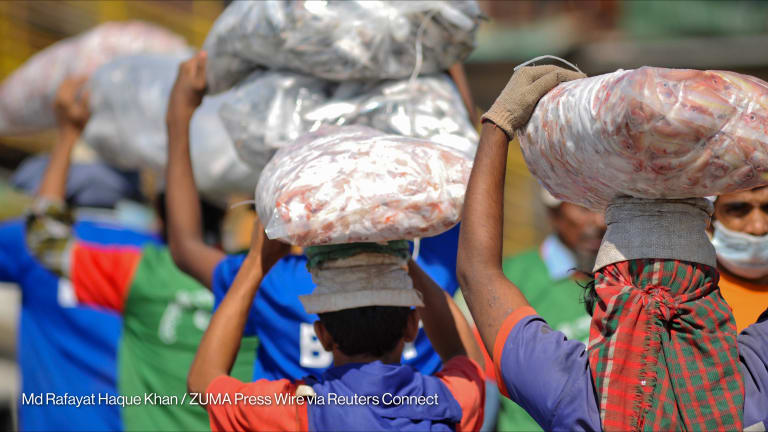Opinion: How incentivizing small tobacco farmers can change livelihoods

Tobacco use is responsible for 7 million deaths a year. Yet its use isn’t the only problem; tobacco cultivation harms farmers’ health, drives deforestation, pollutes water supplies, and is associated with child labor and poverty.
The World Health Organization estimates that tobacco cultivation and production is responsible for 5 percent of deforestation worldwide. Its production takes months longer than many food crops and releases tons of waste and chemicals into the water, soil, and air.
Tobacco cultivation also displaces food crops, heightening food insecurity among rural and low-income communities. The WHO Framework Convention on Tobacco Control, the first WHO international treaty on health, obliges signatories to “have due regard to the protection of the environment and the health of persons in relation to the environment in respect of tobacco cultivation.”
Going for Goals: How to innovate on health sector financing
Despite major improvements in health outcomes over the past 30 years, we still have a long way to go. Achieving the Sustainable Development Goals will need considerable resources, which is why finding innovative financing methods will be critical to their success or failure. Devex examines some of the challenges and opportunities of different financing mechanisms — from public-private partnerships, to blended finance and impact investing.
Even as smoking rates decline in developed economies, tobacco remains a hugely profitable business. In 2015, the world's six largest cigarette manufacturers made a profit of more than $62 billion. But those profits are largely captured by international investors and rarely reach the farmers and factory workers at the beginning of the supply chain.
If tobacco farming isn’t that profitable — and causes all these other problems — why do farmers grow it? The main reason is that they lack viable alternatives, or the capital required to make the switch. Independent farmers — and most of them operate and sell independently — are often “locked” into long-term exploitative contracts with tobacco companies.
Transitioning farmers away from tobacco and toward alternative crops, or indeed other livelihoods, is a way to unlock progress toward multiple Sustainable Development Goals.
What can be done to help farmers transition? United Nations-led and U.N.-assisted alternative livelihoods programs have demonstrated important successes in major tobacco producing countries such as Bangladesh, Brazil, Kenya, and Zambia.
Studies show that most tobacco farmers are willing to abandon tobacco cultivation and switch to alternative crops and livelihoods if assisted with viable crop selection, easy access to inputs, extension and marketing services, crop protection, and stable product prices. Access to education, training, and skills development programs are also needed for those looking beyond agriculture.
Alternative livelihoods projects, therefore, need to provide tobacco farmers a complete range of services: Inputs, training, farm and market education, credit, and insurance.
The comprehensive nature of these projects requires large up-front investments. However, governments often lack the required financial resources or political support.
Enter social impact bonds, an innovative financing instrument that can help fill this investment gap. Social impact bonds are also referred to as “pay-for-success” schemes. They see private investors provide upfront capital for a particular social or environmental intervention — for example, measures to reduce youth unemployment or to preserve biodiversity. They then work with service providers — public sector agencies, private companies or non-profit organizations — to deliver the program. If it is successful — confirmed by independently verified evidence — the investor is repaid for their initial investment, plus a small return for the financial risks they took. If the outcomes are not met, the investor stands to lose their money. Investors can be repaid by national governments, aid donors, philanthropists — or a combination.
The United Nations Development Programme, working in partnership with the WHO FCTC secretariat, is working to apply this innovative financing model to tobacco cultivation and has developed a proposal for the world’s first tobacco social impact bond, or TSIB.
The objective of the bond is to support tobacco farmers to transition from tobacco cultivation to economically viable and environmentally sustainable alternatives. Under TSIB, UNDP identifies countries where there is strong buy-in from local tobacco farmers and communities, and high-level political support. Ecological considerations also matter, such as the climatic and soil conditions for alternative crops.
The financing model requires robust metrics to measure successful performance. TSIB will aim for a mix of social and environmental outcome targets along with completion dates for different targets which will trigger payments to investors.
In Peru, this model has been used to strengthen and modernize cocoa and coffee production; in Serbia, UNDP has developed a social impact bond to finance youth unemployment programs. A rhinoceros conservation impact bond has also been developed by a consortium of international conservation organizations.
Using social impact bonds to address alternative livelihoods for tobacco farmers is a new concept, but is aligned with the Addis Ababa Action Agenda on financing for development, which calls on the international community to develop innovative finance models to address sustainable development challenges.
As the international community searches for new ways to finance the ambition of the 2030 Agenda for Sustainable Development, innovative finance models that involve both public and private finance providers are increasingly seen as important approaches.
Social impact bonds, although still relatively new, small, and bespoke, can allow affordable access to capital, and generate other benefits such as offloading risks and frontloading resources. We are committed to innovating their use, and in doing so, furthering both livelihoods and health.
Search for articles
Most Read
- 1
- 2
- 3
- 4
- 5









